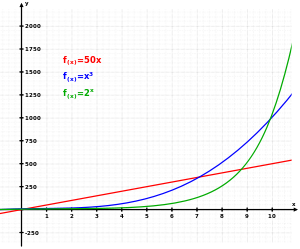
Back نمو أسي Arabic Eksponent artım Azerbaijani Creixement exponencial Catalan Exponenciální růst Czech Экспонентăлла ӳсĕм CV Eksponentiel vækst Danish Exponentielles Wachstum German Εκθετική αύξηση Greek Crecimiento exponencial Spanish Eksponentsiaalne kasvamine Estonian

Exponential growth is a process that increases quantity over time at an ever-increasing rate. It occurs when the instantaneous rate of change (that is, the derivative) of a quantity with respect to time is proportional to the quantity itself. Described as a function, a quantity undergoing exponential growth is an exponential function of time, that is, the variable representing time is the exponent (in contrast to other types of growth, such as quadratic growth). Exponential growth is the inverse of logarithmic growth.
If the constant of proportionality is negative, then the quantity decreases over time, and is said to be undergoing exponential decay instead. In the case of a discrete domain of definition with equal intervals, it is also called geometric growth or geometric decay since the function values form a geometric progression.
The formula for exponential growth of a variable x at the growth rate r, as time t goes on in discrete intervals (that is, at integer times 0, 1, 2, 3, ...), is
where x0 is the value of x at time 0. The growth of a bacterial colony is often used to illustrate it. One bacterium splits itself into two, each of which splits itself resulting in four, then eight, 16, 32, and so on. The amount of increase keeps increasing because it is proportional to the ever-increasing number of bacteria. Growth like this is observed in real-life activity or phenomena, such as the spread of virus infection, the growth of debt due to compound interest, and the spread of viral videos. In real cases, initial exponential growth often does not last forever, instead slowing down eventually due to upper limits caused by external factors and turning into logistic growth.
Terms like "exponential growth" are sometimes incorrectly interpreted as "rapid growth". Indeed, something that grows exponentially can in fact be growing slowly at first.[1][2]
- ^ Suri, Manil (4 March 2019). "Opinion | Stop Saying 'Exponential.' Sincerely, a Math Nerd". The New York Times.
- ^ "10 Scientific Words You're Probably Using Wrong". HowStuffWorks. 11 July 2014.
© MMXXIII Rich X Search. We shall prevail. All rights reserved. Rich X Search
